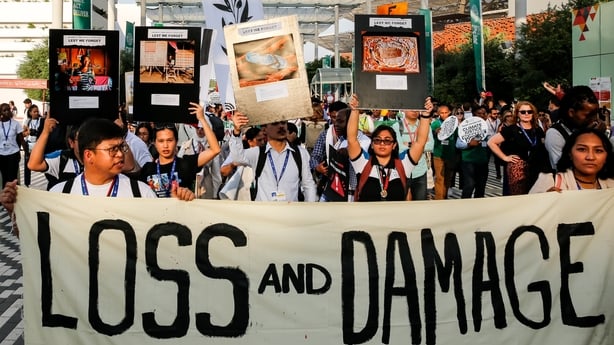It must be quite sickening to attend these COP28 climate negotiations as a campaigner from a poorer, less-developed country, at the forefront of the climate crisis.
Or as a person from a small developing island state at risk of being washed away by rising sea levels.
Not because Dubai is home to enormous wealth - a space age city; buildings that literally scrape the sky, tallest in the world; ultra-clean, ultra modern, metro train system - no drivers, no ticket collectors, no grime; a shopping mall with 1,200 shops; six-lanes on the highway (both ways); Bentleys, Porsches, Ferraris, SUVs; very low taxes.
Jeepers you can smell the money in Dubai. But that’s not why COP28 could sicken a climate campaigner from a poor vulnerable country. Rather it is that in the middle of all this wealth there is so much meanness.
It is hard to put your finger on the source of the meanness. It may be just the way the financial world works. But it is hard to shake the feeling there is not enough generosity on display at COP28.
Of course, there was a big success on the first day of these marathon climate negotiations when the Loss ands Damage Fund was agreed against all odds.
This fund is to provide money for poorer and vulnerable countries after they have been flattened and devastated by climate disasters.
What was "big" about this "success" was that any fund was agreed at all, and also that it happened on day one of a COP.
But there is nothing big about the money that has been promised or pledged by the richer nations.
The United Arab Emirates kicked it off with $100 million (€92 million). Germany matched that. Then a trickle of countries helped push the fund to just under €800 million 12 days later.
But that is so small compared to what is needed and those who contributed seem to be looking for a pat on the back for their generosity.
There was some surprise that United States, among the biggest and wealthiest fossil fuel guzzlers in the world, gave only $17.5 million (€16.2 million) for Loss and Damage.
Russia said it would consider contributing to the fund but only out of the Russian overseas money and assets frozen by western governments after it invaded Ukraine.

"Very Russian" was how Mary Robinson, the Chair of the Elders, described that announcement at COP28.
Ireland too has been criticised by its own NGOs and overseas aid organisations after pledging just €25 million to the fund over two years - most likely €10 million in 2024 and then €15 million in 2025.
Irish people are known for their generosity towards countries and people in difficult circumstances like famines and natural disasters.
Last August the Government projected cumulative Exchequer surpluses amounting to €62 billion over the next five years.
We have even had to invent new definitions of GDP to accommodate the billions flowing into State coffers from multinational corporate profits from their global activity.
GDP "star" is one of them. Easy money really.
The Taoiseach even said openly and boldly during his national statement at the start of COP28 that Ireland is a wealthy nation.
Yet the Irish Government turned up at COP28 with an offer of just €50 million in total global climate finance.
And half of that money was to be spread out over three years starting in 2025
So the Government of a supposedly generous country with a population of five million people came to COP28 with a promise to pledge climate finance of approximately 0.00000008% of the spare money it is expecting to have.
It was put (separately) to the Taoiseach, the Tánaiste, and the Minister for Environment, the three Government leaders, that perhaps people at home might have expected a little more generosity from Ireland towards the poor and devastated.
Each of the leaders gave the exact same answer. It was as if they had been well schooled about the issue by policy advisers, or Department of Finance Officials.
They each said that on a per-capita basis Ireland’s contribution was one of the highest in the world - second only to the United Arab Emirates.
And that’s it right there.
That’s why a campaigner from a poorer, less-developed country must be frustrated by COP28.
There is simply lots of talk about climate finance, but nobody seems to want to pay.
In 2009 the wealthier nations promised to provide $100 billion (€93 billion) per year in climate finance for poorer nations to help them deal with the consequences of the climate change chaos by the fossil fuel consumption of richer nations.
Yet even now, 14 years later, that target has never been reached. The poorer countries are still waiting.
There is a huge focus at COP28 now on the phasing out of fossil fuels. The hope is that developing countries will be able to leap-frog the need for basic fossil fuel infrastructure and invest instead in renewable energy infrastructure.
But that requires money. Big money. And everyone knows it.
But precisely how is that money going to be made available? Who is going to make it available? When is it going to be made available? What strings will be attached?
And how do you ensure that governments and corporations all over the world become far more generous to the people and the nations on the front line of the climate crisis.
These are the questions that must be answered at COP28 over the next few days if we are to have any chance of reducing the global dependence on fossil fuels.







